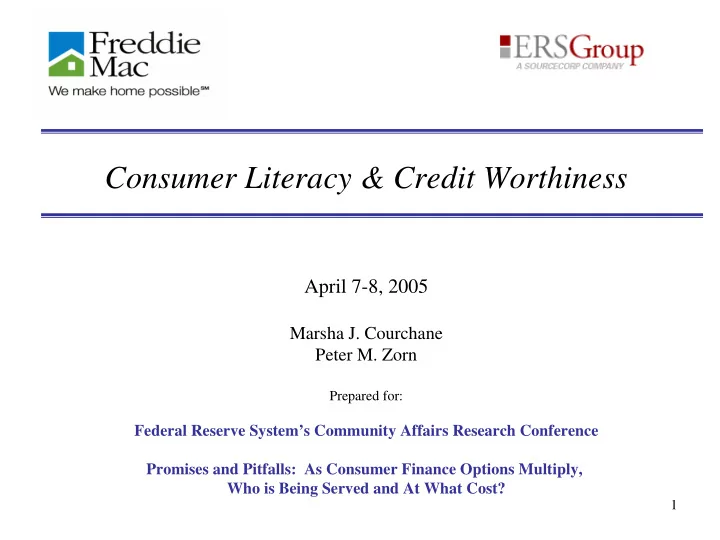

Consumer Literacy & Credit Worthiness April 7-8, 2005 Marsha J. Courchane Peter M. Zorn Prepared for: Federal Reserve System’s Community Affairs Research Conference Promises and Pitfalls: As Consumer Finance Options Multiply, Who is Being Served and At What Cost? 1
Overview of Purpose & Policy Objectives Purpose: We want to better understand consumer literacy and credit worthiness. (Determinants? Policy instruments?) • Rely on unique data: survey information on finances, attitudes, experiences and behaviors & credit information from credit files --12,140 respondents aged 20 to 40, with household incomes under $75,000 Policy Questions Addressed: 1. Does consumer literacy impact credit worthiness? 2. Does consumer literacy impact financial behavior? If so, can improved literacy improve behavior? 3. Do financial behaviors impact the likelihood of having impaired credit? If so, will interventions that change behavior change credit worthiness? 2
Model of Credit Worthiness Financial Additional Variables: • Source of Knowledge Knowledge • Self Assessed Knowledge • Parental Influence (Consumer Literacy) • Objective Knowledge • Income & Variability Self-Assessed & • Attitudes • Home Ownership Objective • Locus of Control • Employment • Ability to Cope • Credit Counseling Financial Behavior • Financial Safety Net • After School Job (Self Control) • Feelings • Education/Loan • Budgeting and Saving • Income/Net Worth • Gender/Age/Children • Ability to Control • Ex-Spouse Effects • Marital Status Finances • Race Additional Variables: • Behavior Financial Outcomes • Bad Events (Credit worthiness) • School of Hard Knocks • Negative Events • Divorce Impacts • Financial Stress and Strain • Management of Finances 3 • Agreement about Finances
Key Results • Consumer Financial Knowledge: – Learning experiences, formal education & counseling impact financial knowledge – Credit card usage/payment patterns, income & net worth & having a financial safety net also impact knowledge • Financial Behavior – The key explanatory variable for behavior is financial knowledge. – The set of psychological factors also had an expected large impact on financial behavior (a respondent behaves “better” if more optimistic, taking fewer risks, not worrying too much about money, and being able to cope) – Income relative to parents and the existence of a safety net are more important than actual income, net worth or home ownership • Credit Outcomes – The key predictor for credit outcomes is financial behavior. 4 – Also important: income (variability) measures, spousal behavior
Conclusions Using a very unique data set designed to help us understand the interactions between literacy and credit worthiness, we have been able to find support for the following: • Consumer literacy matters! • Behavior is not explained simply by rationale economic behavior – other influences seem to matter (psychological factors, locus of control, parental and spousal influences) • Credit outcomes can change and increased knowledge (and awareness of that knowledge) can lead to better financial behavior and improved credit outcomes. 5
Recommend
More recommend